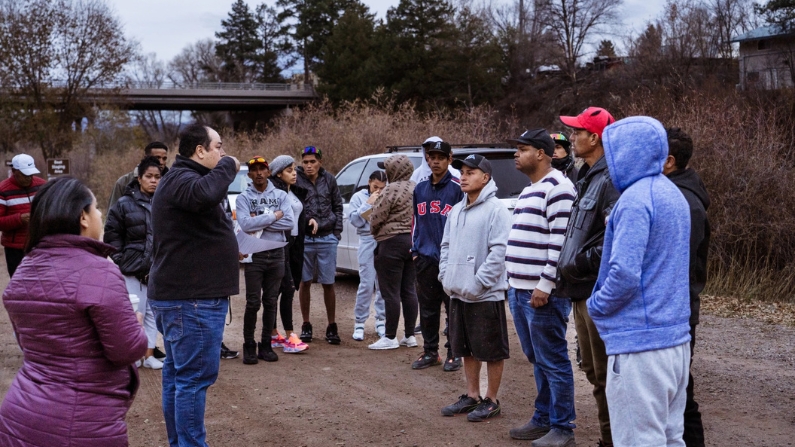President-elect Donald Trump has threatened mass deportations starting in places like Aurora, Colorado when he takes office in January.
The promise has shaken immigrants across the country, and organizations that serve them on the Western Slope are preparing — closing legal loopholes and caring for families facing an uncertain future.
Halle Zander spoke to three nonprofits taking legislative and service-oriented approaches to see how they’re helping families prepare for possible Immigration and Customs Enforcement raids and other actions.
She spoke about her reporting with Eleanor Bennett.
Eleanor Bennett: So, let’s start with a local group — Voces Unidas. What are they doing ahead of Inauguration Day, Jan. 20?
Zander: So, Voces Unidas is a Latino advocacy organization, and although they’re based in Glenwood Springs, they work in 16 counties across the Western Slope.
They organize for policy change at the local, state and national levels.
Alex Sanchez, the president and CEO of Voces Unidas, is working closely with House District 57 Rep. Elizabeth Velasco on some policies they hope to introduce in January.
Sanchez said it was too early to talk details yet, but he said it aims to enhance and strengthen protections for many communities, including immigrants.
On a more local level, there are municipalities in Colorado, like Denver, that prohibit city employees from sharing personally identifiable information with federal agencies like Immigration and Customs Enforcement (ICE).
Voces is trying to get other local governments to follow suit and adopt similar policies.
Sanchez says cities and towns on the Western Slope should believe Donald Trump when he says he’s going to conduct mass deportations, and that our communities could be impacted by it.
“We are not insulated, obviously, from a hostile federal government that wants to come in and do massive disruptions to our economy, obviously to humans, and the impact that will have to families, to children, the disruptions that it could possibly have to employers, to the economy — Aspen, Vail, Breckenridge, Telluride. We can’t have these mountain resort communities without the workforce.”
Trump’s immigration policies are expected to spur several legal challenges in the next four years.
Bennett: Now, the American Civil Liberties Union, or the ACLU, has a branch in Colorado. And they often use the courts as a tool for securing rights within Colorado. What are their plans for the next few months?
Zander: So the ACLU is mainly working to secure some legal loopholes that they think could put immigrants at risk, particularly when it comes to Colorado’s rights when working with the National Guard.
So if the Trump Administration tried to use the National Guard to carry out mass deportations in Colorado, Gov. Jared Polis could block that.
Title 32 of the U.S. Code requires joint deployment of the National Guard, which means the governor and the federal government both agree to deploy the military officers.
So the ACLU’s legal teams want to make sure Polis is prepared to deny authorization of the National Guard for mass deportations.
They’re also meeting with the governor this week about establishing additional protections, but they wanted to meet with him first before providing more details.
Bennett: Now most of these efforts have focused on policy changes. Is anyone working directly with immigrant families, and what services are they providing?
Zander: Yes, in addition to the immigration lawyers hard at work across Colorado right now, the Colorado Immigrant Rights Coalition, or CIRC, is offering direct services to families who are facing an uncertain future under the second Trump administration.
First, they’re organizing more “Know your rights” trainings for families.
They want to make sure people know about some of the laws Colorado has passed protecting immigrants’ rights since the last Trump administration.
In 2024 alone, the state established a grant program for organizations that help immigrants who arrived in the U.S. in the past year navigate state services.
They also removed barriers for undocumented immigrants to receive driver’s licenses.
But one of the things CIRC wants people to remember is that if ICE comes to your house, you do not have to open the door unless they have a court order signed by a judge.
And it’s important to know what those court orders look like, because ICE has its own internal document that it uses that can be confused as a warrant.
CIRC is also seeing more people requesting family preparedness packets.
These are documents that help families prepare for what happens if an undocumented family member is held in a detention facility or deported.
It helps you make plans for the children involved and guides family members on how to find you if you get picked up by ICE.
Bennett: How are immigrant families feeling right now as the Inauguration Day gets closer?
Zander: Well, there’s a lot of fear.
CIRC is reporting that families are scrambling to try and adjust their status, but these processes take years, if not decades.
Raquel Lane-Arellano is their communications manager and says it’s really a somber moment for them right now.
“We’re trying to help as much as we can. And I think the reality is that for thousands of families, there’s just no path, right? There’s no way to make the next four years safer if there’s no path for you and your family to citizenship,” Lane-Arellano said. “So the alternative is to prepare for the worst, which is deportation.”
Experts say Trump learned a lot from his first four years and will likely be more effective in passing some of his policies during this term.
However, as I said, Colorado has passed a lot of protections.
Denver Mayor Mike Johnston has made several comments indicating he supports protecting undocumented immigrants here.
So, it’s not completely clear how Trump’s efforts will play out on a local scale.
Bennett: Well, Halle, thanks for being here.
Zander: Thank you.





